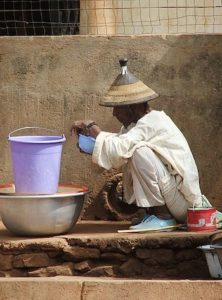
*The Fula community is celebrated on this date in 1000. They are among the largest ethnic groups in the Sahel and West Africa.
The Fula, Fulani, or Fulɓe people are widely dispersed across the region, inhabiting many countries. They live mainly in West Africa and northern parts of Central Africa, as well as in South Sudan and Sudan and areas near the Red Sea coast. The approximate number of Fula people is unknown due to clashing definitions regarding Fula ethnicity; various estimates put the figure between 35 and 45 million worldwide. A third, or an estimated 12 to 13 million, are pastoralists, and their ethnic group has the largest nomadic pastoral community in the world.
Most of the Fula ethnic group consisted of semi-sedentary people and sedentary settled farmers, artisans, merchants, and nobility. As an ethnic group, they are bound together by the Fula language, their history, and their culture. More than 98% of the Fula are Muslims. The origins of the Fulani people are unclear, and various theories have been postulated. As a nomadic herding people, they have moved through and among many other cultures. Franz Skutsch notes that their oral histories point toward a start in Jordan or farther east but also that their language comes from the Senegambian region. He concludes that the modern Fulani people began in the northern Senegambian region.
In his book The History of the Upper Guinea Coast, Walter Rodney argues that Fulbe was initially from North Africa and conquered the Foota Djallon region led by the Fulani Koli Tenguella. The ethnogenesis of the Fulani people may have begun due to interactions between an ancient West African population and North African populations such as Berbers or Egyptians. Their West African roots may be in and around the valley of the Senegal River. They likely reflect a genetic intermix of people of West African, North African, and Arabian origins and have been a part of many ruling dynasties, particularly in Sahel and West Africa. Speculations about their origins started following the Berlin Conference era of European conquest and colonization.
Many West African leaders are of Fulani descent, including the President of Nigeria, Muhammadu Buhari; the President of Senegal, Macky Sall; the President of Gambia, Adama Barrow; the Vice President of Sierra Leone, Mohamed Juldeh Jalloh; and the Prime Minister of Mali, Boubou Cisse. They also lead major international institutions, such as the Deputy Secretary-General of the United Nations, Amina J. Mohammed; the 74th President of the United Nations General Assembly, Tijjani Muhammad-Bande; and the Secretary-General of OPEC, Mohammed Sanusi Barkindo.